|
|
|
Sort Order |
|
|
|
Items / Page
|
|
|
|
|
|
|
| Srl | Item |
| 1 |
ID:
118386
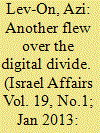

|
|
|
|
|
| Publication |
2013.
|
| Summary/Abstract |
This article is part of a pioneering study which analyses Internet usage by some 600 candidates for heads of 156 local authorities in Israel in the municipal campaigns of 2008. Despite the importance attributed to the municipal elections in the Arab-Palestinian sector in Israel, the high turnout rate, the competitiveness of the elections and the continuing penetration of the Internet, it was scarcely used by candidates, compared to about 50% usage by candidates who competed in municipalities with Jewish populations. Interviews suggest that beyond access gaps, additional obstacles impede the usage of the Internet as an effective political tool in the Arab-Palestinian sector.
|
|
|
|
|
|
|
|
|
|
|
|
|
|
|
|
| 2 |
ID:
103358
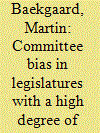

|
|
|
|
|
| Publication |
2011.
|
| Summary/Abstract |
The institution of committees in democratic legislatures has for years been said to bias policy making because the preferences of committee members differ from, and are more alike than, those of other legislators due to self-selection to the committees. Based on an analysis of United States Senate committees, Hall and Grofman suggested in 1990 that the preferences of committee members primarily diverge from, and are more alike than, those of non-committee members on policy issues that are salient to constituencies or at least to an easily definable segment of constituencies. This article argues that the logic of Hall and Grofman should in fact be reversed in legislatures characterised by highly cohesive parties. Accordingly, the main hypothesis is that in such legislatures the preferences of committee members are more likely to be alike than those of non-committee members in the committees that work with policy issues of less salience to constituencies. Using a large-scale comparative design comprising data collected in 2008 on the spending preferences of 1,348 Danish local politicians, evidence is found supporting this hypothesis. This finding points to the importance of considering the role of parties when assessing committee bias.
|
|
|
|
|
|
|
|
|
|
|
|
|
|
|
|
| 3 |
ID:
124728
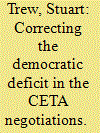

|
|
|
|
|
| Publication |
2013.
|
| Summary/Abstract |
The federal government claims that the Canada-EU Comprehensive Economic and Trade Agreement (CETA) negotiations have been the most transparent and participatory in Canadian history. Labour, environmental, social justice, and other civil society groups that are critical of the proposed agreement for various reasons would argue that their perspectives have been excluded from the official federal dialogue. This article looks at some of the efforts of non-governmental (civil society) actors, and in particular the Trade Justice Network and its member organizations, to affect the CETA negotiations in other ways, with an emphasis on contact with provincial governments, municipalities, European decision makers, and other non-governmental groups in Canada and Europe. It is argued that the exclusion of critical views shows an inherent democratic deficit in the CETA negotiations that privileges corporate insiders at the expense of civil society, the public, and even elected officials. Notwithstanding this deficit, the success of the civil society campaigns can be seen in the problem areas delaying a successful conclusion of negotiations, including new public procurement restrictions for Canadian municipalities and pharmaceutical patent term extensions. For the Trade Justice Network, these areas also help explain how the agreement narrows the fields of economic, environmental, and social governance in Canada.
|
|
|
|
|
|
|
|
|
|
|
|
|
|
|
|
| 4 |
ID:
151325


|
|
|
| 5 |
ID:
098214


|
|
|
|
|
| Publication |
2010.
|
| Summary/Abstract |
Global concern with climate change has led to the development of a variety of solutions to monitor and reduce emissions on both local and global scales. Under the United Nations Framework Convention on Climate Change (UNFCCC), both developed and emerging countries have assumed responsibility for developing and updating national inventories of greenhouse gas emissions from anthropic sources. This creates opportunities and incentives for cities to carry out their own local inventories and, thereby, develop air quality management plans including both essential key players and stakeholders at the local level. The aim of this paper is to discuss the role of local inventories as an urban public policy instrument and how this type of local instrument may bring advantages countrywide in enhancing the global position of a country. Local inventories have been carried out in many cities of the world and the main advantage of this is that it allows an overview of emissions produced by different municipal activities, thereby, helps decision makers in the elaboration of efficient air quality management plans. In that way, measures aimed at the reduction of fossil fuel consumption to lower local atmospheric pollution levels can also, in some ways, reduce GHG emissions.
|
|
|
|
|
|
|
|
|
|
|
|
|
|
|
|
| 6 |
ID:
098547


|
|
|
|
|
| Summary/Abstract |
Global concern with climate change has led to the development of a variety of solutions to monitor and reduce emissions on both local and global scales. Under the United Nations Framework Convention on Climate Change (UNFCCC), both developed and emerging countries have assumed responsibility for developing and updating national inventories of greenhouse gas emissions from anthropic sources. This creates opportunities and incentives for cities to carry out their own local inventories and, thereby, develop air quality management plans including both essential key players and stakeholders at the local level. The aim of this paper is to discuss the role of local inventories as an urban public policy instrument and how this type of local instrument may bring advantages countrywide in enhancing the global position of a country. Local inventories have been carried out in many cities of the world and the main advantage of this is that it allows an overview of emissions produced by different municipal activities, thereby, helps decision makers in the elaboration of efficient air quality management plans. In that way, measures aimed at the reduction of fossil fuel consumption to lower local atmospheric pollution levels can also, in some ways, reduce GHG emissions.
|
|
|
|
|
|
|
|
|
|
|
|
|
|
|
|
| 7 |
ID:
150778


|
|
|
|
|
| Summary/Abstract |
The article examines the climate action plans (CAPs) of local governments (LGs) in Denmark. Applying a quantitative content analysis approach, all Danish LG action plans within the climate and energy field has been collected and coded, giving insight into the extent of LG CAPs. We assess the extent, targets and scope of LG CAPs and find that Danish LGs are highly involved in mitigation activities with a widespread CAP adoption and an overall high degree of sectoral coverage on base year accounts and action plans, albeit with some significant shortcomings. If current LG CAPs were to form the basis of a decentralised climate governance system, some improvements in target level and sectoral coverage should be implemented. The utilization of regional supporting structures facilitating a gradual improvement seems especially promising. In addition the research points to the significant mitigation potential of considering the full spectrum of local government actors, not simply the pioneers and how local CAPs outside urban pioneers require additional local policy framing to succeed. Focusing on the mutual benefits for national and local actors of an integrated planning system, and the multiple benefits locally, will be key in motivating further action.
|
|
|
|
|
|
|
|
|
|
|
|
|
|
|
|
| 8 |
ID:
186156
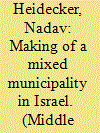

|
|
|
|
|
| Summary/Abstract |
This article discusses the birth of the municipality in the city of Acre after the 1948 Arab-Israeli War. Hitherto a predominantly Arab city, Acre became a mixed city following the Palestinian exodus and the Jewish immigration wave. However, despite the sizable Jewish community, Acre, like other Arab-majority cities in the newly-established Jewish State, was placed under military rule. The article examines archival material to draw out the local power struggles in Acre until the lifting of the military rule in the city and the election of its first mayor in October 1951 and explores the intricate interrelations between the local actors and the central government. Acre thus serves as a case study for an analysis of the tactics used by Mapai, Israel’s ruling party, to combat its political rivals in the Arab sector—most notably the Israeli Communist Party—and exert its hegemony over Israel’s Arab minority.
|
|
|
|
|
|
|
|
|
|
|
|
|
|
|
|
| 9 |
ID:
189542
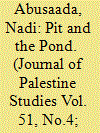

|
|
|
|
|
| Summary/Abstract |
The rationalization of urban water-supply systems and networks was a pressing concern in the development of modern cities globally in the late nineteenth and early twentieth centuries. The rise of the modern city did not manifest only in the complete overhaul of water and sewage infrastructures but also in the creation of new mechanisms of urban governance to manage them. Examining understudied municipal water projects in Jaffa and Nablus, two chief centers of light industry in the late Ottoman and Mandate eras, this paper provides an analysis of the historical relationship between urban governance and urban infrastructures in modern Palestine. It investigates the involvement of Palestinian urbanites in the debates over municipal water projects in their cities, demonstrating that these constituted more than merely utilitarian instruments and were foundational to the articulation of urban rights in modern Palestine.
|
|
|
|
|
|
|
|
|
|
|
|
|
|
|
|
| 10 |
ID:
176848


|
|
|
|
|
| Summary/Abstract |
A growing number of municipalities have developed clean energy goals and policies to reduce their carbon emissions among other objectives. One emerging pathway municipalities have used to achieve clean energy goals is through including these objectives in electric franchise agreements. An electric franchise agreement is a negotiated contract between a municipality and an electric service provider which among other stipulations grants the utility the right to serve customers in the municipality's jurisdiction. This is the first nationwide assessment of the municipal opportunity to pursue franchise agreements with electric service providers, along with the potential impact of these agreements on achieving clean energy goals. We conclude that municipalities across at least 30 states have the authority to pursue franchise agreements. Our bounding scenarios suggest widespread deployment of renewable energy via franchise-driven partnerships could result in 164 – 911 TW h of renewable energy potentially serving 15.8 – 87.7 million households. Though there is immense opportunity to leverage franchise agreements to achieve renewable energy objectives, future deployment will be dependent on the negotiations between an electric service provider and individual municipalities.
|
|
|
|
|
|
|
|
|
|
|
|
|
|
|
|
| 11 |
ID:
191386
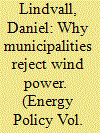

|
|
|
|
|
| Summary/Abstract |
This article explores municipal acceptance of wind power in Sweden and draws conclusions on the basis of semi-structured interviews with municipal decision-makers, together with analysis of documents and statistical data. In line with previous research, it demonstrates that wind power opposition is more complex than just a NIMBY effect. The attitudes of local residents influence municipal decision-makers, but may also act to augment and mobilize opposition. Perceptions of distributional injustice, generated by the lack of local economic benefits and the geographically uneven deployment of wind and hydropower, are also relevant in explaining community and municipal acceptance. Moreover, municipal acceptance depends on national political discourses, economic aspects, institutional settings, regulations and sociopolitical factors. To overcome acceptance barriers, the article argues for the need of some kind of formal compensation schemes, directed to both local communities and the municipality. The authority of the municipality to levy taxes on wind power could potentially rectify perceptions of energy injustice between different geographic regions, stimulate higher approval rates, and motivate municipalities to assume a role as an intermediary, accommodating different, and sometimes conflicting, local, national, and global interests.
|
|
|
|
|
|
|
|
|
|
|
|
|
|
|
|
|
|
|
|
|